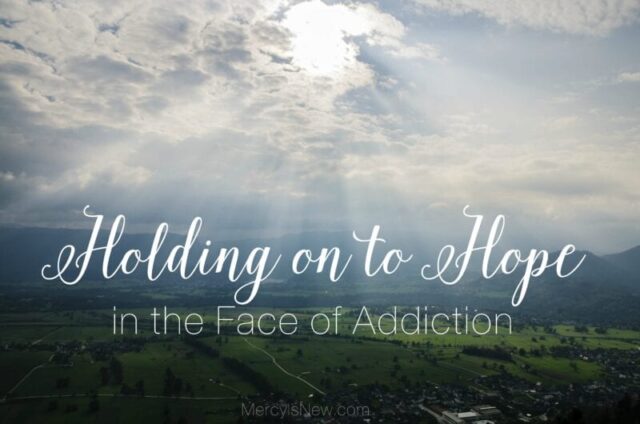
Please help me welcome my sweet friend Caroline Duncan to the blog today. She is sharing from the heartache of her own family’s story in the hopes of helping even one of you to know you are not alone and that there is always hope…
I walked down the steep basement stairs alongside my mother, holding hands as we descended, afraid of what kind of wreckage we would find. My brother had broken in again, this time too deliberately to be mistaken for a drugged attempt to find a place to sleep. As we surveyed the mess before us, I watched my mother’s face go pale, changing quickly from confusion to despair: a look I saw on her face far too often. Our precious books were ruined. Eleven years of stable, treasured memories were suddenly altered; destroyed. Surprisingly, grief is the first wave to hit you in a drug related crisis. There is a deep loss of the person that comes with the breaking down of memories with who you once knew.
In 1999 the United States Mint started making state quarter coins as part of an initiative to honor each state in our nation. I was eight years old at the time. I had an older brother who was eleven, a younger brother who was four, and the most spectacular parents. My dad worked during the day and came home for a brief window before going out again to his night classes shortly before our bedtime. During his time at home, we would build pine straw forts, play Legos, or chase him around the house on all fours, us being the dogs and him being the possum to catch. We would finally overtake him all at once, bringing our possum down and erupting into laughter, punching, and roughhousing. My mother was always finding sweet and interesting things for us to do together. For one of these activities, she bought three ‘state quarter collection books.’ They were tri-fold cardboard covered in red, white, and blue and with a map of the United States inside where you could push the quarter of each state in its place. We opened our after-school presents excitedly and wrote our names in our own books. Over the course of the next eight or ten years, we collected quarters for our books.
Every time we got an Icee at the gas station or my mother checked out at a store, we excitedly searched through the change for a state quarter. Each time it was followed with ‘Whose turn is it to put the new quarter in their book?’ If there were three state quarters, we each got one. We would hold them tightly in our hands until we got home. Our mother would get our books and we would push our quarters into their places, comparing who had what states left and who had the most quarters. As we got older, the excitement of getting a quarter faded, but the competition remained on who would get all their quarters first. We mostly cared to show mom that we loved her and cared that she created a fun memory for us. I don’t remember when each of us got them or who won, but I know I was almost 14 by the time my book was filled. Our books sat propped up on the bookshelves, a secure memory of togetherness and intentionality shown by our beloved parents.
As a 20-year-old at the bottom of those basement stairs, I held my emptied quarter book in my hands and held back tears while I watched my mother hold my brothers’ books in disbelief. How did we get here? What had our loved one needed so badly that he would steal our quarters from our books; corrupting valued memories with the ones he loved most? Knowing that the quarters only equaled $37.50, not nearly enough for the next hit of drugs, in exchange for priceless memories was too much pain to bear.
That is the strangest thing I’ve learned about addiction: it is a process of grieving that steals memories and damages your past as much as your present and future. Questions relentlessly press on us when we stare into the face of addiction, questions about God and questions about ourselves. Where is God when we can’t find one another? Where is God when the present darkness takes over memories we’ve already made? Where is God when despair replaces hope and when disappointment becomes as natural as breathing?
Addiction spreads as quickly as a wildfire, affecting friends, family, co-workers, schoolmates, sometimes before the beloved addict even knows what they have started. The effects of the addiction slowly but surely break you down physically, mentally, emotionally, and spiritually. I have learned much in my 25 years but have not learned it all, and am so very far from mastering one of the most basic concepts; hope. After becoming a Christian at age 15 I struggled with guilt over not having hope in the face of addiction. It felt strange to my young mind that a Christian would struggle with hope, since hope in Jesus and the cross is the basis for our belief system. Shouldn’t I have faith like a child and hope for the best, letting go of the pain of the past and fear of the future? As I’ve grown older, I realized that it felt strange to me to feel hopeless because so many in the church aren’t honest about their own problems grasping it. I went from a confused (but seeking answers) 15 year old to a bitter 19 year old and then moved to a complete disillusionment with Christians by the time I graduated college as a 22 year old.
In the last few years, I have finally learned that God still brings freedom and hope, even in the face of hopelessness and the shame over feeling the loss of hope in my spiritual life. Together, we have forged through more addiction-related crisis and painful moments than I care to recall. God and I, we have moved through the moments hand in hand, sometimes walking steadily, and sometimes feeling like I couldn’t get my face off the ground and wipe my tears away to manage one more breath.
Hope, alongside life, seems to operate in past, present, and future tense. Those early days spent getting our quarters and being children were filled with hope, untouched by addiction and grief. Satan tries to use addiction to not only ruin your present days and worry for the future, but it also takes you backwards, wondering what you could have done differently, and wondering if life was as charmed and simple as you saw it then. Luckily, through Christ, I have cast off shame from my struggle to believe, my struggle to hope. Thankfully, I serve a living God, a strong God, a faithful when I’m faith-less, God. Romans 4:18A; 20-21 says, “Against all hope, Abraham in hope believed. Yet he did not waver through unbelief regarding the promise of God, but was strengthened in his faith and gave glory to God, being fully persuaded that God had power to do what He had promised.” God has showed me that while I will pray in hope against addiction, and without knowing what kind of answers I will get to those prayers, I can grasp onto the hope that God has given me through my own deliverance.
God has promised to be there. God has promised me that He holds my heart and my family in his hands, giving me Hope. Always giving me more hope.
**Read the new spiritual memoir, All The Pretty Things, by Edie Wadsworth for another story of HOPE and REDEMPTION in the midst of addiction and loss.
 I’m Caroline Duncan. I live just outside of Asheville, North Carolina in Swannanoa with my husband Curt & my beautiful eight month old daughter Arden. We serve at Biltmore Church where Curt is the Student Pastor. After growing up with addiction intertwining itself around myself and many of my family members, I found freedom through Jesus Christ and have sought hard after Him and encouraging others to find their own freedom. My very favorite thing in the world is to come alongside others on a daily basis and fight for hope amidst our struggles. I spend my days molding my sweet girl, doing ministry work alongside our awesome church, making, taking, & eating tons of food, and having intriguing conversations with our students, usually over a waffle house table, about living a fulfilling life with God.
I’m Caroline Duncan. I live just outside of Asheville, North Carolina in Swannanoa with my husband Curt & my beautiful eight month old daughter Arden. We serve at Biltmore Church where Curt is the Student Pastor. After growing up with addiction intertwining itself around myself and many of my family members, I found freedom through Jesus Christ and have sought hard after Him and encouraging others to find their own freedom. My very favorite thing in the world is to come alongside others on a daily basis and fight for hope amidst our struggles. I spend my days molding my sweet girl, doing ministry work alongside our awesome church, making, taking, & eating tons of food, and having intriguing conversations with our students, usually over a waffle house table, about living a fulfilling life with God.
Yes addiction is a thief, but sometimes it is also a mask. It covers some underlying problem like a mental health issue. People self medicate because they don’t have access to mental health doctors, and don’t know how to access them if they are present. Keep up the good work, but have in mind the mental health aspect of addiction and advocate for intervention, have a list of mental health resources in your area and work in conjunction with them. Be blessed
Well stated. Addiction has a rippling effect . Thank you for sharing.